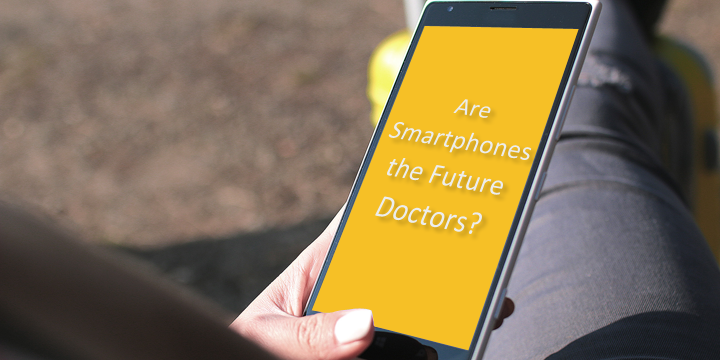Are Smartphones the Future Doctors?
The advent of the smartphone is literally redefining the lives of people today. Over the past few years, one can notice the stark difference in how they lived only a couple pf decades ago. The things seen and read in science fiction movies and books are reality today. Technology has entered every aspect of our lives, so much so that it is difficult to imagine life without personal devices, especially smartphones which provide the easiest medium to go “online” anytime anywhere. In fact, the number of mobile phone users in the world is expected to pass the five billion mark by 2019.*
An interesting question to ask is whether smartphone are the future doctors? Well, they sure seem to have now made inroads in to the medical field. The smartphone is one of ubiquitous and forceful trends in communication. This new cell phone can also be used for communicating through email, Internet searches, video & photo messaging and by using specific applications.
The impact of the smartphone in medicine is quite significant already. Almost seventy percent professionals in the medical field own a smartphone. It seems to have a positive implication on patient’s health, and the doctor-patient relationship.
Unlike the older generation where home monitoring equipment was used to record data manually, out-patients now use software or peripheral hardware that plugs into a smartphone or tablet and helps record vital data like weight, blood sugar levels, blood pressure, pulse, heart rhythm, oxygen concentration in blood, etc. This stored data can be transmitted securely to the medical records or to the physicians. Moreover, it can also be converted into more comprehensive visual formats such as graphs that communicate trends over time and often include explanations of suitable ranges for a health metric, given patient-specific factors such as weight, age and sex. These software applications on the smartphone help to enhance patient engagement, as she is now aware of her medical statistics.
Technological advancement has put powerful medical devices into patients’ hands through the smartphone. Devices which are exclusively available at doctors’ clinic like visual acuity assessment, optic disc visualization (ophthalmoscope), body sound analysis (stethoscope), lung function (pyrometer), inner ear visualization (otoscope), heart function (ECG), and even sonography (ultrasound) can all now be conducted using an app or peripheral hardware. These apps collect clinically relevant data, thus saving a lot of time when the patient visits the doctor.
An app is already being developed to detect Alzheimer’s, through an online quiz. Various apps are being created to detect eye infections. In fact, a new app will help detect Glaucoma through smart phone eye examination. There are also wristbands and apps that help check vital signs, diet, movements, and activities for medical purposes. A smart phone attachment can help in physical examination like the skin, oral cavity, throat, lungs, and heart. Today the smart phone is also being tested out to accurately diagnose HIV and syphilis in some parts of the world. With all the collected data, the phones can alert you and help prevent onset of diseases.
Every day new apps are emerging to detect health problems easily and in a less expensive manner – it is indeed possible that some day smart phones will be able to give you a primary health check. They, in fact, enhance the doctor patient relationship and patient engagement leading to a healthier lifestyle.
*References –
http://www.statista.com/statistics/330695/number-of-smartphone-users-worldwide/




